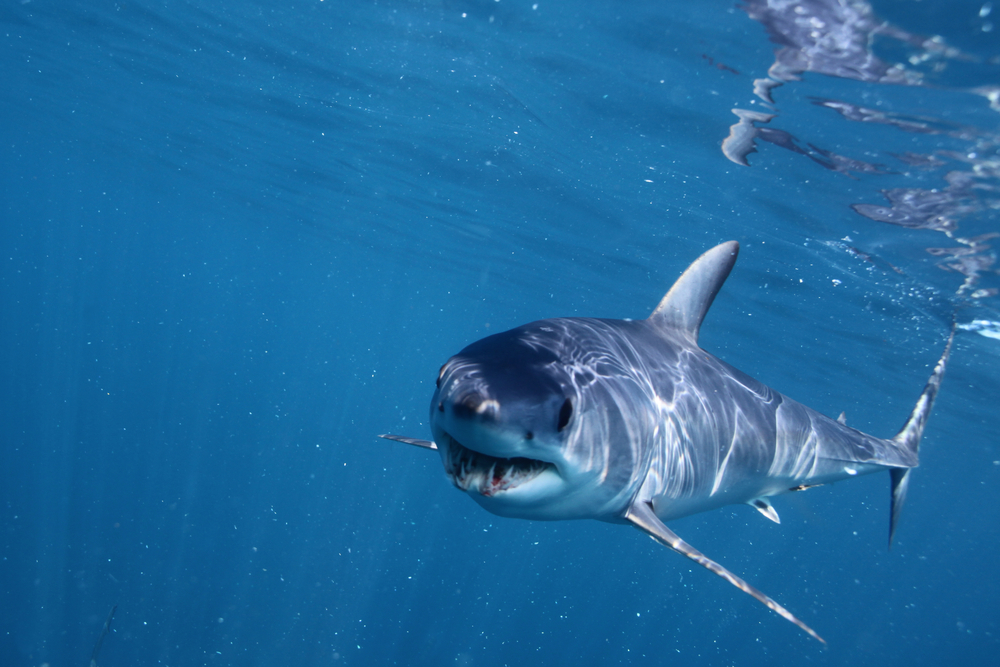
The sudden onset of summer in Britain over the last few weeks has produced a familiar surge of hysterical claims with one common denominator: sharks surround the UK coast, just waiting to chomp those swimmers, surfers and paddlers with enough pluck to enter the chilly water.
In the last week alone, a fishing charter operator has claimed a client was reeling in a blue shark when it was taken by a much bigger beast, and a surfer has released footage supposedly depicting an attack by a great white in waters of Harlyn Bay, near Padstow, which has been much derided by his peers.

Most of these ‘Jaws off Cornwall’ stories are spurious at best, but they get media oxygen because everyone is fascinated and a bit terrified by the apex predators of the seas, and exploiting this kind of interest is a standard tabloid technique to flog more papers or get more hits.
However, according to Christopher Bird, a shark ecology expert at the University of Southampton, they are right in one respect: Britain is home to many sharks, just not species that are likely to lop your leg off.
‘Sharks in the British Isles are something to be cherished, not feared,’ writes Bird in The Conversation. He goes on to explain that about 40 species of shark can be found in the waters around the UK, ranging from glow-in-the-dark velvet belly lantern sharks to real life leviathans like basking sharks (the second biggest fish in the world) and greenland sharks, recently revealed as the longest living vertebrate on the planet.
The much-feared great white, also known as the white pointer, has occasionally been spotted in European waters—indeed, they’re believed to use the Mediterranean as a nursery, and a tagged great white named Lydia came within 700 miles of the Devon coast a couple of years ago—but there has never been a confirmed sighting in the UK, much less an actual attack.

Besides behemoth basking sharks, which do cruise the coastline of Britain, but eat nothing bigger than plankton, species seen in UK waters that could be confused for great whites include blue sharks, porbeagle and mako sharks, sometimes referred to as the blue pointer.
Porbeagle and mako sharks are actually close cousins of the great white and, along with blue and thresher sharks, are predatory species that can reach a decent size and have a fairly ferocious appearance. However, they primarily visit the British coast while chasing migratory fish, and pose very little real threat to people on British beaches.
‘Despite the incredible number of different shark species in British waters, there has never once been a fatal “attack” on humans,’ says Bird. ‘Although, in 1937, a basking shark capsized a boat in Kintyre, Scotland, causing all three crew members to drown. But the rare bites that have been documented are often sustained by recreational fishermen while trying to tackle sharks onto their boats.’
Sadly, the same can not be said the other way around. Bird points to recent research that has revealed intensive fishing, climate change and habitat destruction has likely led to significant depletion of shark numbers in the North Sea.
There are currently no annual limits for many species of sharks found in European waters, and populations of mako and porbeagle sharks are particularly impacted by fishing.
About a hundred million sharks are killed globally every year, often targeted for their fins which are then sold to Asian markets for shark fin soup,’ Bird explains. ‘In recent years, as other fish stocks have declined, shark meat is increasingly making its way on to the market.’
And, even as the latest round of red-topped headlines claimed that Jaws was patrolling the Southwest coast, less sensationalist news outlets were reporting incidents such as this one, where the bodies of two blue sharks were discovered on a beach in Cornwall with their tails amputated.
[geoip-content not_country=”CA”]
ON THE APP
 21st Century Shark
21st Century Shark
Although sharks have existed for thousands of millennia and survived through several mass extinctions, over the past century many of these incredible creatures are on the verge of being wiped out by mankind. Follow marine biologists attempting to raise public awareness of sharks and protect these ancient predators from becoming modern day prey.
Want to watch 21st Century Shark for free right now? Subscribe to the Love Nature streaming app and start your 30-day free trial of the best on-demand natural history documentaries out there. [/geoip-content]

